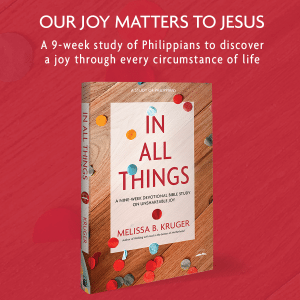One week from today my new book, In All Things: A Nine-Week Devotional Bible Study on Unshakeable Joy, officially releases. I’m officially exited.
This spring I had the pleasure of getting to teach through the book in our women’s Sunday school class at church. (If you’d like to use the lessons as you work through the book, you can find our audio and teaching outlines here.) I began our time studying together explaining why joy is a topic that is bigger than our own personal satisfaction or happiness. A Christian’s joy is rooted in theological understanding that overflows into our daily living. It affects the watching world, the church, and is important to Jesus.
The World
A joyful heart shines the truth of what we believe to the world. It matters. Christians are not immune to hardship, trial, and suffering. However, we experience them differently than others do. We have hope in the darkness. Peter instructed, “But in your hearts honor Christ the Lord as holy, always being prepared to make a defense to anyone who asks you for a reason for the hope that is in you.”
It’s interesting, isn’t it? A Christian’s hope shines to the watching world in such a way that we need to be prepared to defend our hope! We should expect and be ready for instances where people approach us, asking, “Why are you so hopeful?”
Pastor and theologian D. Martyn Lloyd-Jones wrote of the need for this type of joy and hope as a witness in the world:
If ever the world needed the witness and testimony of Christian people it is at this present time. The world is unhappy, it is distracted and frightened, and what it needs is to see stars shining out of the heavens in the midst of the darkness, attracting the world by rebuking that darkness, and by giving it light, showing how it too can live that quality of life.
Couldn’t the same words be said of the world today? Let us not follow the cultural descent into despondency. Our theology—our understanding of God’s redemptive plan—allows us to hold joy and sorrow side by side and not be in opposition to one another. We can mourn circumstances that are hard and at the same time rejoice in a God who works all things for good.
A few months ago, I listened to a podcast with Joni Eareckson Tada. When Joni was a teenager, she was paralyzed from the shoulders down in a diving accident. She described those who suffer in profound ways—yet still have hope and joy—as “spectacles of glory.” They’re like the burning bush Moses saw and was confused by—how could the bush be on fire, and yet not consumed? The bush was a spectacle of glory, something that made you turn and look in wonder.
Joni explained that Christians who suffer faithfully shine the light of Christ in a way that is perplexing to the watching world. They simply don’t understand how a person could be joyful, patient, and kind in the midst of such hardship. Profound suffering opens us up to be a spectacle of glory for all the world to see the beauty of Christ in us. It demonstrates we have something greater than this world. We have Jesus, and can proclaim with the psalmist, “You make known to me the path of life; in your presence there is fullness of joy; at your right hand are pleasures forevermore” (Psalm 16:11).
The Church
When Paul wrote to the Thessalonian church, he shared with them his concern for their well-being. He knew they had suffered greatly, and he was deeply concerned about their faith, so he sent Timothy to check on them. Timothy returned with the positive report that Thessalonians were standing firm in love, hope, and faith. In the midst of his own suffering, Paul was encouraged:
In all our distress and affliction we have been comforted about you through your faith. For now we live, if you are standing fast in the Lord. For what thanksgiving can we return to God for you, for all the joy that we feel for your sake before our God. (1 Thess. 3:7)
The Thessalonians’ contentment in hardship and struggle encouraged Paul in the midst of his own suffering. As we stand firm in hope, rejoicing in the Lord, the church is encouraged. Our joy in the Lord stirs up fresh courage in others, blessing our brothers and sisters in the faith.
Jesus
On the night before he died, Jesus shared a final meal and conversation with his disciples. Though they didn’t understand that Jesus was about to die, Jesus knew his time was short.
The apostle John recorded much of their conversation. Jesus comforted his disciples and encouraged them to not be troubled. He assured them that although he was going away, he would come back for them. He told them that if they loved him, they would obey him. He explained that the Spirit would come and dwell within them and be with them always.
And then Jesus explained why he was telling them all these things.
Jesus was on his way to the cross. He was preparing to endure unimaginable pain. At this moment, what was on his mind? What goal prompted his last words to those he loved? He told them: “These things I have spoken to you, that my joy may be in you, and that your joy may be full” (John 15:11).
Jesus was concerned about our joy.
At the height of his own agony, his love desired our joy. It’s unbelievable, isn’t it? For the joy set before him, Jesus endured the cross (Hebrews 12:2). And Jesus wasn’t hoping for us to have a little bit of happiness. He wants us to have fullness of joy—overflowing, abundant. Our joy matters to Jesus.
Our joy matters for more than ourselves. It causes the world to question, the church to rejoice, and is the hope of our Savior. It’s a good thing to pursue.
In All Things walks through the book of Philippians and focuses on the difference between worldly happiness and biblical joy. I hope it’ll be a resource that leads you to the fount of all joy, and offers refreshment in the journey. If you’d like to have a sneak peek at the first chapter, you can find it here.



















